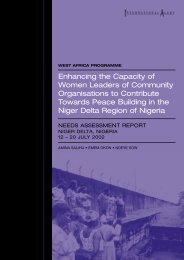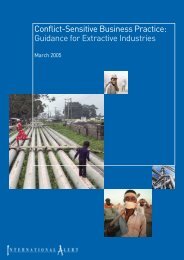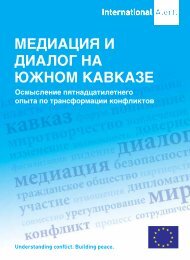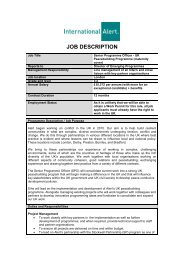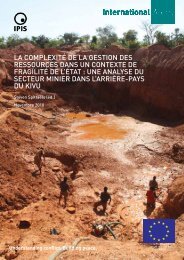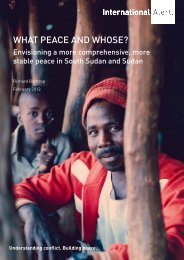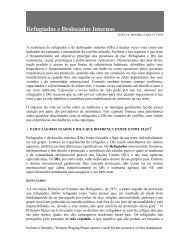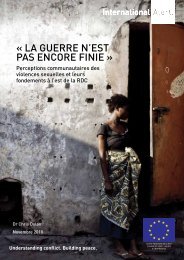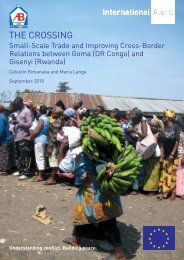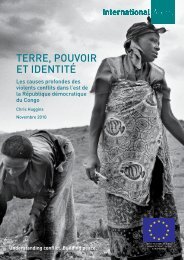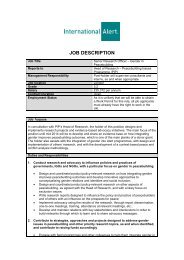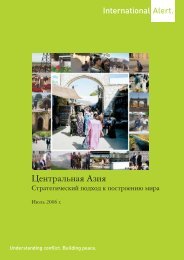Full report - International Alert
Full report - International Alert
Full report - International Alert
- No tags were found...
You also want an ePaper? Increase the reach of your titles
YUMPU automatically turns print PDFs into web optimized ePapers that Google loves.
9• Women’s Bodies as a Battleground: Sexual Violence Against Women and Girls During the War in the Democratic Republic of Congoregarded as war crimes, crimes of genocide and crimes against humanity, and that the perpetratorsof such crimes are brought to justice in the appropriate courts of law. 5However, although these efforts on the part of the international community are to be welcomed, ithas to be said that they have failed to prevent acts of sexual violence, which continue on a massivescale in conflict zones. Impunity likewise remains a major problem, despite the advances representedby the creation of the <strong>International</strong> Criminal Court (ICC) and the prospect of the perpetrators ofgender-based crimes during conflicts having to answer to this court for their acts. The DRC hasadhered to the Rome Statute but the ICC can only take on cases regarding crimes committed priorto 1 July 2002. In the DRC, none of the fighting forces involved in the war has been made to faceup to the atrocities committed against women, girls and the entire civilian population.The women of South Kivu mobilised very early on to denounce the sexual violence and impunity andto fight for the recovery of the victims’ rights. In the provincial capital Bukavu, the CCVS (CoalitionContre les Violences Sexuelles/Coalition Against Sexual Violence) was formed following aconsultative meeting between several local women’s organisations. The CCVS put forward to theCongolese legislative authorities proposals for reforming the national criminal law, with a view toredefining and reinforcing provisions against rape. However, these proposals went unheeded.Congolese women have also taken steps to provide concrete assistance to victims. For example, inthe Uvira area, women’s refuges (‘Maison des Femmes’) have been opened by women’s organisations,offering a place of refuge and also material, psychological and medical support to women who havebeen raped. Thanks to this initiative, more and more victims are finding the courage to speak openlyabout the atrocities committed in their own areas, which makes it easier both to take care of themand to discover the scale of the problem.This study was commissioned, with <strong>International</strong> <strong>Alert</strong>’s support, by two women’s organisations inSouth Kivu, Réseau des Femmes pour un Développement Associatif (RFDA), based in Uvira, andRéseau des Femmes pour la Défense des Droits et la Paix (RFDP), which has its headquarters inBukavu. The women who were interviewed displayed great courage in recounting the many forms ofviolence and cruelty they had endured. We extend our warmest thanks to them .We are also deeply grateful to the organisations and centres supporting victims of rape and violence,who were not only kind enough to supply us with extremely useful documentation and raw data forour research, but also enabled us to make contact with the people we wished to interview. Inparticular we would like to mention: Centre Olame, Union pour l’Emancipation des FemmesAutochtones (UEFA), the Junior and Saint Paul medical centres, Vision Teqoa, the Lemera hospitalat Panzi, Save Humanitarian, Arche de l’Alliance, Association de Lutte pour la Défense des Droits dela Femme et de l’Enfant (ALUDROFE), Solidarité des Femmes Activistes pour la Défense des DroitsHumains (SOFAD), the Ordonnance Baraka dispensary, Solidarité des Femmes de Fizi pour le BienêtreFamilial (SOFIBEF) and Programme de Secours aux Vulnérables et Sinistrés (PSVS).The political and military authorities were contacted in the areas where we carried out our research,and they provided our investigators with information, and a degree of security or protection, forwhich we thank them. We should also mention the Maï Maï and other fighters who were interviewed,even if we did not obtain a great deal from these interviews.We can never thank enough the consultants who agreed to carry out this research in a difficultsecurity context. Finally, we are deeply grateful to all those who made a valuable contribution to thisstudy, through their constructive comments when the results of the research were made public, at theRound Table held at the Restaurant Bodega in Bukavu on 28 November 2003 and at the paneldiscussions in New York during the 48th session of the UN Commission on the Status of Women,and in Washington at the Woodrow Wilson <strong>International</strong> Center for Scholars in March 2004. We5.The Protocol Relating to Women’s Rights was adopted by the 2nd ordinary session of the Conference of Heads of State and ofthe Government of the African Union, held at Maputo in Mozambique, July 2003.



